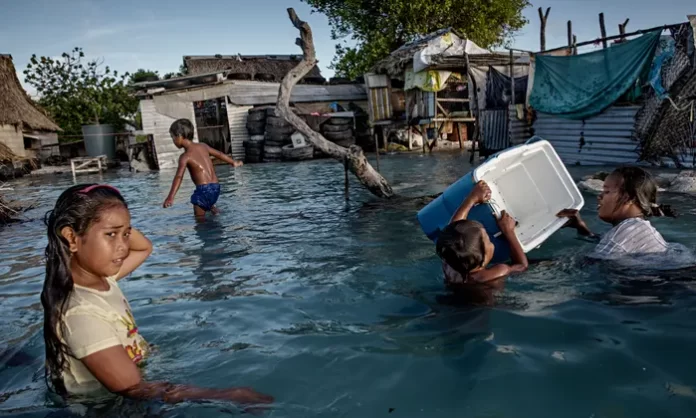Rich countries will continue to miss a longstanding pledge to provide poor countries with US$100bn a year in climate finance for the next four years, new analysis suggests on the eve of a crunch meeting of world leaders at the UN on Monday.
The promised cash is seen as essential to gaining support from developing countries for a global climate deal to fulfil the 2015 Paris agreement, with only six weeks go before vital UN climate talks, called COP26, to be hosted in Glasgow this November.
However, current pledges and announced plans from developed country governments will amount to only about US$93bn to US$95bn a year in climate finance by 2025, according to Oxfam.
More than 30 world leaders have been invited to a vital meeting on Monday on the sidelines of the UN general assembly in New York. Co-hosted by António Guterres, the UN secretary general, and Boris Johnson, the UK prime minister, the meeting will focus on climate finance.
A Whitehall source told the Guardian the aim of the meeting was to bring together the leaders of big economies with the leaders of poor countries that are likely to suffer most from the climate crisis. Some of the world’s poorest countries will have the chance at the meeting to demonstrate how vital it is both for more funding to be made available, and for large economies – including China – to cut their greenhouse gas emissions faster.
Poor countries need climate finance to help them cut greenhouse gas emissions and cope with the impacts of extreme weather. They were promised in 2009 that US$100bn a year would be provided, from public and private sources, from 2020 to 2025.
Data from the OECD on Friday showed that climate finance reached only US$80bn in 2019, falling $20bn below the 2020 target. Oxfam’s projections, which build on the OECD data, show that recent pledges to increase those amounts in the next four years are still inadequate.
Alok Sharma, the UK cabinet minister who will preside over the Cop26 talks, said: “There is no excuse: delivering on the US$100bn goal is a matter of trust. Climate finance is key to unlocking emissions reductions and action to adapt to climate change across the developing world.
“We have seen little progress and the OECD report shows clearly how much further there is to go. Achieving the US$100bn goal is one of my biggest priorities and ahead of the UN General Assembly I am repeating my call for developed countries to step up their climate finance pledges.”
Nafkote Dabi, global climate policy lead at Oxfam International, said: “The pandemic has shown that countries can swiftly mobilise trillions of dollars to respond to an emergency – it is clearly a question of political will. We are in a climate emergency [that] is wreaking havoc across the globe and requires the same decisiveness and urgency. Wealthy nations must live up to the promise made 12 years ago and put their money where their mouths are.”
As well as trying to wring higher pledges of cash from donor countries, the UK and the UN will also hope to persuade some of the world’s biggest emitters at the meeting to strengthen their pledges on cutting greenhouse gas emissions in the next decade.
It is not yet known whether Xi Jinping, president of China, will attend Monday’s meeting, which will be a hybrid of in-person and virtual. China – the world’s biggest emitter, responsible for more than a quarter of global carbon output – is now the focus of frantic diplomacy from the UK and the U.S, as the country has yet to submit formal plans to the UN on emissions cuts ahead of COP26.
At last year’s virtual UN general assembly, Xi surprised the world by setting a target of reaching net zero emissions by 2060 and ensuring the country’s emissions peak before 2030. Bernice Lee, research director for futures at the Chatham House thinktank, warned that another dramatic announcement from China was unlikely at this year’s UN general assembly but said that there were encouraging signs from the country, as many provinces were peaking their emissions.
The UN published a report on Friday showing that current emissions pledges from all countries fall far short of the halving of carbon dioxide needed in the next 10 years to limit global temperature rises to 1.5C, the tougher of two targets in the 2015 Paris agreement. On current national pledges, emissions would rise by 16 percent by 2030.
The issues of climate finance and greater ambition on emissions cuts from China are closely linked. China is not a beneficiary of climate finance, but likes to be seen as a leader to developing countries. At previous Cops – conference of the parties to the UN Framework Convention on Climate Change, parent treaty to the Paris agreement – building coalitions of vulnerable countries, for whom climate finance is essential, has been a key factor in persuading China to increase its efforts.
SOURCE: UN NEWS CENTRE/PACNEWS














